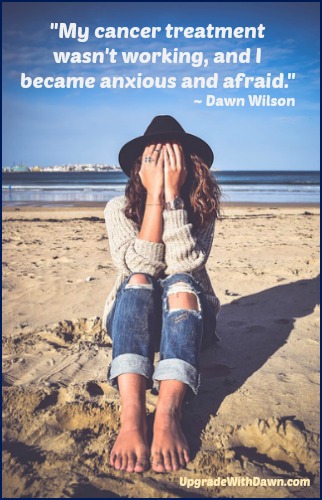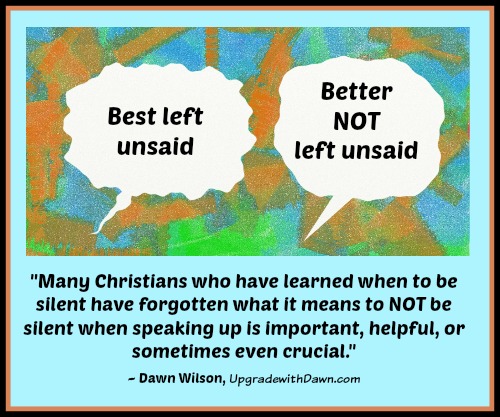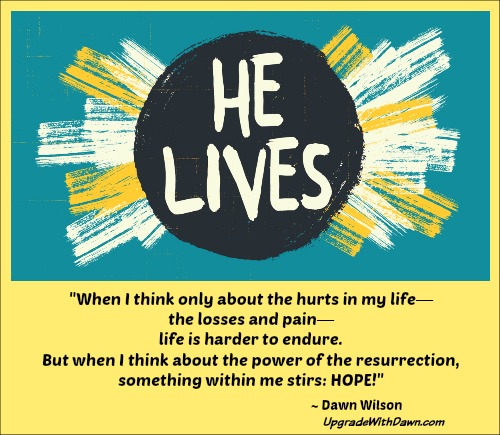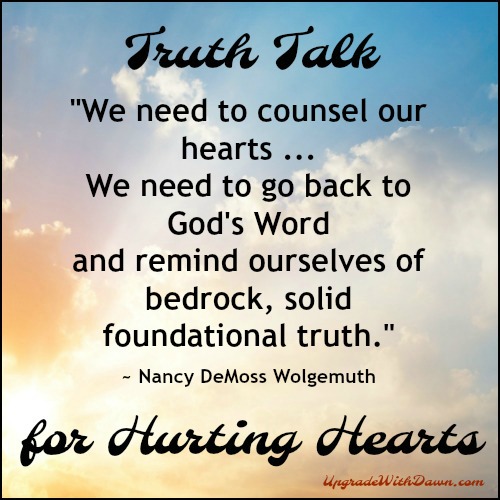Whom Did Jesus Praise? Will He Praise You? - Part 1
In this Spiritual Life UPGRADE in two parts, Dawn Wilson encourages us to consider some of the people Jesus praised while He was on earth.
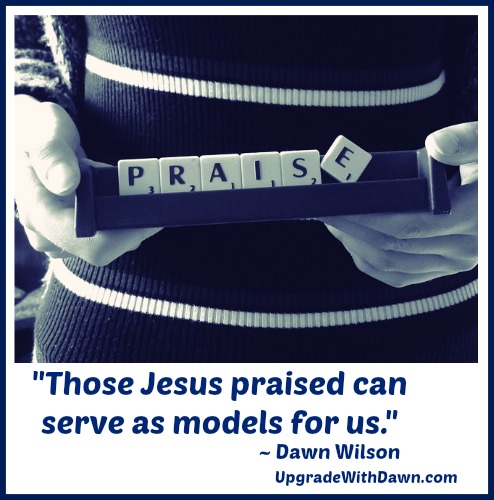
In Part 1 of “Who Did Jesus Praise?” we'll consider: (1) a group of people Jesus praised, (2) one of His near relatives, and (3) a woman He noticed who probably thought no one was watching.
Let’s explore each point of praise.
1. Those with “Unseeing” Faith
Thomas believed because he saw the resurrected Jesus—he trusted his senses—and Jesus gave him measured commendation (even though it was also a bit of a rebuke because his faith was slow and late). Thomas had an opportunity to believe Jesus was resurrected without seeing, but he rejected it. We have that same opportunity today.
Jesus, speaking to Thomas, also Jesus praised those—by saying they were blessed—“who have not seen and yet have believed” (John 20:29). Jesus’ words looked forward to the birth and development of the early Church.
That would also be Christ-followers today!
It's people who see “by the eye of the Spirit”—those who base their confidence on the convictions of their faith.
Peter said,
“Though you have not seen Him, you love Him; and though you do not see Him now; you believe in Him and rejoice with an inexpressible and glorious joy” (1 Peter 1:8).
Bible commentary writer Albert Barnes said, “All faith is of things not seen; and God blesses those most who most implicitly rely on His Word.”
Authentic faith depends on God’s words to us and not our eyes of flesh. Jesus praised those who would have faith that the Word of God is true concerning Him.
If I want to please the Lord, I will have “unseeing faith.” So will you!
2. One Who Turns People to Righteousness
In Matthew 11:7-19, we hear Jesus’ analysis of His friend John. (This is John the Baptist, Jesus’ cousin who he likely loved (Luke 1:36)—not John the apostle, who Jesus also dearly loved).
John the Baptist was a prophet of God, but Jesus said he was “much more” (Matthew 11:9). John, unlike the Old Testament prophets, could be considered a New Testament servant of God. He was in a unique position of ministry in-between the testaments. He was a great witness regarding the Lord.
John pointed people to the Messiah, preparing the way of Christ. He preached repentance in preparation for the blessings of God and God’s Kingdom. John pointed Jesus out as the Lamb of God who would take away sin (John 1:29-37).
John baptized Jesus, and in that great event he heard God’s pronouncement about Jesus (Matthew 3:13-17). Jesus said there had not risen a greater than John the Baptist born of woman (except for Himself, of course). Jesus said (in Matthew 11:14) John’s ministry was like Elijah’s (see also Malachi 3:1; 4:5-6).
John turned many to righteousness—he was anointed by God for a great responsibility.
John was also a New Testament martyr. He was eventually arrested and killed for Jesus’ sake. He had lived and died what Jesus taught to His disciples in Matthew 10, and John’s enemies sought to kill him, just like they sought Jesus.
It is likely John, while he was in prison by Herod, likely for over a year when he wondered whether the Messiah would come to “set the prisoner free and loose the captives.” He asked two disciples to ask Jesus, “Are you the one who is to come, or should we expect someone else?” (Matthew 11:3).
The majority of Israelites were not receiving Jesus as Messiah and He was strongly rejected by the leaders. John likely wondered why Jesus wasn’t moving quickly to do His messianic work. (There’s a great post on this here.)
Jesus sent a message to John about the miracles He was performing, and then He proceeded to praise John. Jesus understood the trial His beloved relative was enduring. There was no condemnation.
John would have to trust that his relative, Jesus, knew what He was doing. And Jesus’ words to him were enough to bolster his faith.
Jesus defended John’s integrity and believed John was firm in the faith. John wasn’t a fickle man, tossed about by public opinion and or conformed to their way of thinking. And he was highly disciplined. He was a great witness for the Lord—fervent and zealous—and God gave him the opportunity to announce the coming Kingdom, even though others would see it in its glory, not him.
Jesus indicated the most humble believer would have greater understanding and opportunity than John—and potentially be greater than John.
Believers today can also prepare the way for the Lord—for His second coming. We can, like John the Baptist, call believers to repentance. We may find opposition when we take a stand, share the Gospel, and point out the sorrows of sin. Many, like the proud and worldly scribes and Pharisees, will oppose us like they opposed John.
Remember, greatness with God is determined by faithfulness and obedience!
3. A Disciples’ Confession of Faith
In Mark 8:27-29, Jesus praised Peter for his extraordinary statement about His identity.
Jesus asked His disciple, “Who do PEOPLE say that I am?
Peter, outspoken and usually a spokesman for the disciples in the Gospel records, replied that some said Jesus was John the Baptist. Others said Elijah, and still others said He was one of the prophets.
Jesus purposely set up this scenario, a contrast, between what His closest friends thought about him and what the people outside that group—who didn’t really know Him—thought about Him.
Clearly, the view of the crowds wasn’t accurate enough or high enough. Jesus was a prophet, but so much more, and the disciples had begun to see that. God the Father was opening their eyes.
Jesus zeroed in on Peter’s thoughts and heart, asking,
“But who you YOU say that I am?”
Peter answered, “You are the Christ.”
Peter saw Jesus as the Messiah, the Anointed One. In the Old Testament, under the old covenant, prophets, priests and kings were anointed (1 Kings 19:16; (Exodus 40:12-15; 1 Samuel 16). And
Peter likely saw Jesus’ Messiahship in that way.
Jesus, the Messiah is:
A Prophet (Matthew 21:11; Luke 7:16; Mark 6:4) – He taught the Word with authority, often speaking in parables (Mark 1:22). He foretold the future, predicting His death (Matthew 17:22-23), foretold Judas’ betrayal (Matthew 26:20-25) and Peter’s denial (Matthew 26:31-35). He predicted the Holy Spirit’s coming (John 16:7-15), His followers’ persecution (John 16:1-4, 33) and the Temple’s destruction (Matthew 24:1-2). He prophesied His second coming (Matthew 24:30-31; John 14:3). He also performed miracles like other prophets, and compared Himself to other prophets (Luke 4:24-27).
A Priest. His is the believer’s ultimate High Priest (Hebrews 4:14-16) after the order of Melchizedek (Hebrews 7:2; Genesis 14:18). Jesus is our great High Priest forever.
A King. Jesus was given the title “Son of David” and the rightful eternal king after David’s kingship (2 Samuel 7:16; Matthew 1:1; Revelation 22:16). This was foretold to Mary by the angel Gabriel (Luke 1:32-33). The “Son of David” would be a ruler and a deliverer for God’s people. Jesus will return to earth to rule during the Millennium, and then forevermore (1 Corinthians 15:24-28) with all authority (Matthew 28:18). He who has a name above all names will reign as King of Kings and Lord of Lords (Revelation 19:16).
That is Jesus’ true identity. Peter recognized Jesus as “the Son of the living God” (Matthew 16:16).
And Jesus did not deny it. He praised Peter for this confession of faith.
Blessed are you, Simon son of Jonah, for this was not revealed to you by flesh and blood, but by my Father in heaven” (Matthew 16:13-17).
When we don’t understand who Jesus is, it can erode the Church’s foundation. It is also far more intimate: it can erode our individual faith.
The Lord—in the Word of God—reveals who the Father is, who Jesus is, and who the Holy Spirit is. We need to study the scriptures to be sure we get their identities right, so we can also make praiseworthy confessions of faith like Peter!
Observing these these who Jesus praised, we might examine our own hearts:
- Do I have authentic faith, dependent on God’s Word and not what I see in my circumstances?
- Am I taking a brave stand against lies in the culture—even when opposed—and sharing the Gospel with others?
- What is my confession of faith concerning Jesus? Do I truly understand who He is and why that is important?
In Part Two of this post, we will consider two women—a woman who boldly stretched out her hand, and a woman who gave sacrificially—and our hope for future praise.
Do you need to make some adjustments to win the praise of Jesus?
Dawn Wilson, founder and President of Heart Choices Today, is a speaker and author,  and the creator the blog, Upgrade with Dawn. She is a contracted researcher/reviewer for Revive Our Hearts, and a writer at Christianity.com (wiki posts) and Crosswalk.com. She and her husband Bob live in Southern California and have two grown, married sons, three granddaughters and a rascally maltipoo, Roscoe.
and the creator the blog, Upgrade with Dawn. She is a contracted researcher/reviewer for Revive Our Hearts, and a writer at Christianity.com (wiki posts) and Crosswalk.com. She and her husband Bob live in Southern California and have two grown, married sons, three granddaughters and a rascally maltipoo, Roscoe.
Graphic adapted, courtesy of Foto Rieth at Pixabay.
 Post a Comment → Posted on
Post a Comment → Posted on  Wednesday, August 28, 2019 at 4:45AM
Wednesday, August 28, 2019 at 4:45AM  Being Praiseworthy,
Being Praiseworthy,  Dawn Wilson,
Dawn Wilson,  Doubting Thomas,
Doubting Thomas,  Faith,
Faith,  Jesus praised people,
Jesus praised people,  John the Baptist,
John the Baptist,  Peter's Confession of Faith,
Peter's Confession of Faith,  Praise from God,
Praise from God,  Unseeing Faith,
Unseeing Faith,  Upgrade with Dawn Upgrade Your Life
Upgrade with Dawn Upgrade Your Life  Character,
Character,  Spiritual Life
Spiritual Life 




